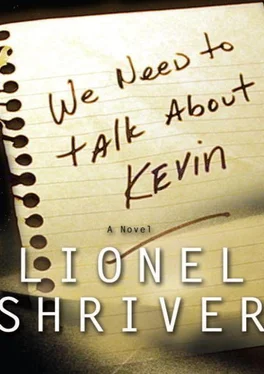So I can see how a woman who’d long slept restlessly on peas might have difficulty lying on an anvil. Nevertheless, it’s a pity that she couldn’t remain within the still, serene well of sheer incomprehension. Oh, I realize you can’t stay bewildered—the need to understand or at least to pretend you do is too great—but I myself have found wide white mystification a place in my mind that is blessedly quiet. And I fear that Mary’s alternative outrage, her evangelical fever to bring the guilty to book, is a clamorous place that creates the illusion of a journey, a goal to be achieved, only so long as that goal remains out of reach. Honestly, I had to fight the impulse at the civil trial to take her aside and charge gently, “You can’t imagine that you’ll feel better if you win, do you?” In fact, I became convinced that she would find more consolation in having what proved a surprisingly slight parental negligence case dismissed, because then she’d be able to nurture this theoretical alternative universe in which she had successfully unloaded her agony onto a callous, indifferent mother who deserved it. Somehow Mary seemed confused as to what the problem was. The problem was not who was punished for what. The problem was that her daughter was dead. Although I couldn’t have been more sympathetic, it was not subject to unloading onto anyone else.
Besides, I might be more kindly disposed to this ultra-secular notion that whenever bad things happen someone must be held accountable if a curious little halo of blamelessness did not seem to surround those very people who perceive themselves as bordered on every side by agents of wickedness. That is, it seems to be the same folks who are inclined to sue builders who did not perfectly protect them from the depredations of an earthquake who will be the first to claim that their son failed his math test because of attention deficit disorder, and not because he spent the night before at a video arcade instead of studying complex fractions. Further, if underlying this huffy relationship to cataclysm—the hallmark of the American middle class—were a powerful conviction that bad things simply shouldn’t happen, period, I might find the naïveté disarming. But the core conviction of these incensed sorts—who greedily rubberneck interstate pileups—seems rather that bad things shouldn’t happen to them . Lastly, though you know I’ve never been especially religious after having all that Orthodox guff forced on me as a child (though luckily by the time I was eleven, my mother could no longer brave the church a whole four blocks away and held halfhearted “services” at home), I still wonder at a race grown so anthrocentric that all events from volcanoes to global temperature shift have become matters for which its individual members are answerable. The species itself is an act, for lack of a better word, of God. Personally, I would argue that the births of single dangerous children are acts of God as well, but therein lay our court case.
Harvey thought from the start that I should settle. You remember Harvey Landsdown; you thought he was self-important. He is, but he told such marvelous stories. Now he goes to other people’s dinner parties and tells stories about me.
Harvey did rattle me a bit, since he’s a get-to-the-point type. In his office, I stumbled and digressed; he messed with papers, implying that I was wasting his time or my money—same thing. We were at odds on our understanding of what constitutes truth. He wanted gist. Me, I think you only get at gist by assembling all the tiny inconclusive anecdotes that would fall flat at a dinner table and that seem irrelevant until you collect them in a pile. Maybe that’s what I’m attempting here, Franklin, because though I tried to answer his questions directly, whenever I made simple, exculpatory statements like, “Of course I love my son,” I felt that I was lying and that any judge or jury would be able to tell.
Harvey didn’t care. He’s one of those attorneys who think of the law as a game, not as a morality play. I’m told that’s the kind you want. Harvey is fond of declaiming that being in the right never won anyone’s case, and he even left me with the unfocused sense that having justice on your side is a faint disadvantage.
Of course, I was not at all sure that justice was on my side, and Harvey found my hand-wringing tedious. He commanded me to stop dithering about how it looked, accepting a reputation as a Bad Mother, and he clearly couldn’t have cared less about whether I really was a bad mother. (And Franklin, I was. I was terrible at it. I wonder if you can ever forgive me.) His reasoning was straightforward economics, and I gather this is how many suits are decided. He advised that we could probably pay off the parents out of court for a great deal less than a sentimental jury might award. Crucially, there was no guarantee that we’d be compensated for court costs even if we won. So that means, I sorted out slowly, that in this country where you’re “innocent until proven guilty” someone can accuse me of whatever he wants and I could be out hundreds of thousands even if I prove the accusation groundless? Welcome to the U.S. of A., he said gaily. I miss you to rail to. Harvey wasn’t interested in my exasperation. He found these legal ironies amusing, because it was not his company started from a single discount plane ticket that was on the line.
Looking back, Harvey was absolutely right—about the money, that is. And I have reflected since on what drove me to make Mary take her case against me to trial in defiance of sound legal counsel. I must have been angry. If I had done anything wrong, it seemed to me that I had already been punished roundly. No court could have sentenced me to anything worse than this arid life in my poky duplex, with my chicken breast and cabbage, my tremulous halogen bulbs, my robotic biweekly visits to Chatham—or perhaps even worse, to nearly sixteen years of living with a son who, as he asserted, did not want me as a mother and who gave me almost daily good reason to not want him as a son. All the same, I really ought to have worked out for myself that if a jury’s damning verdict would never assuage Mary’s grief, a more kindly judgment would never temper my own sense of complicity, either. I’m sad to say that I must have been motivated in some not inconsiderable part by a desperation to be publicly exonerated.
Alas, it was not public exoneration that I truly craved, which may be why I sit here night after night and try to record every incriminating detail. Look at this sorry specimen: As a mature, happily married woman of nearly thirty-seven, she is informed of her first pregnancy and almost faints in horror, a response she disguises from her delighted husband with a pert gingham sundress. Blessed with the miracle of new life, she chooses to dwell instead on a forgone glass of wine and the veins in her legs. She throws herself about her living room to the tune of tawdry popular music with no thought of her unborn child. At a time that she ought best to be learning in her very gut the true meaning of ours, she chooses instead to fret about whether the forthcoming baby is hers . Even beyond the point at which she should have more than learned her lesson, she is still banging on about a movie in which human birth is confused with the expulsion of an oversized maggot. And she’s a hypocrite who’s impossible to please: After admitting that flitting about the globe is not the magical mystery tour she once pretended it was—that these superficial peripatetics have in fact become trying and monotonous—the moment this gadding about is imperiled by the needs of someone else, she starts swooning over the halcyon life she once led when jotting down whether Yorkshire youth hostels provide kitchen facilities. Worst of all, before her hapless son has even managed to survive the inhospitable climate of her clenched, reluctant womb, she has committed what you yourself, Franklin, deemed the officially unspeakable: She has capriciously changed her mind, as if children are merely little outfits you can try on back home and—after turning critically before the mirror to conclude, no, sorry, it’s a pity but this really just doesn’t quite suit —cart back to the store.
Читать дальше












